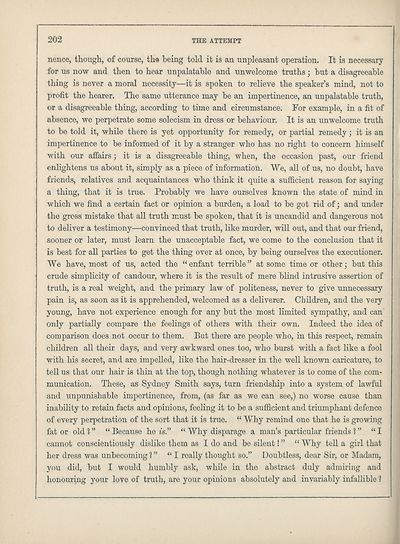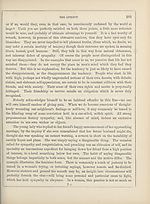Attempt > Volume 1 and Select writings
(214) Page 202
Download files
Complete book:
Individual page:
Thumbnail gallery: Grid view | List view

202
THE ATTEMPT
nence, though, of course, the being told it is an unpleasant operation. It is necessary
for us now and then to hear unpalatable and unwelcome truths; but a disagreeable
thing is never a moral necessity—it is spoken to relieve the speaker’s mind, not to
profit the hearer. The same utterance may be an impertinence, an unpalatable truth,
or a disagreeable thing, according to time and circumstance. For example, in a fit of
absence, we perpetrate some solecism in dress or behaviour. It is an unwelcome truth
to be told it, while there is yet opportunity for remedy, or partial remedy; it is an
impertinence to be informed of it by a stranger who has no right to concern himself
with our afiairs; it is a disagreeable thing, when, the occasion past, our friend
enlightens us about it, simply as a piece of information. We, all of us, no doubt, have
friends, relatives and acquaintances who think it quite a sufficient reason for saying
a thing, that it is true. Probably we have ourselves known the state of mind in
which we find a certain fact or opinion a burden, a load to be got rid of; and under
the gross mistake that all truth must be spoken, that it is uncandid and dangerous not
to deliver a testimony—convinced that truth, like murder, will out, and that our friend,
sooner or later, must learn the unacceptable fact, we come to the conclusion that it
is best for all parties to get the thing over at once, by being ourselves the executioner.
We have, most of us, acted the “ enfant terrible ” at some time or other; but this
crude simplicity of candour, where it is the result of mere blind intrusive assertion of
truth, is a real weight, and the primary law of politeness, never to give unnecessary
pain is, as soon as it is apprehended, welcomed as a deliverer. Children, and the very
young, have not experience enough for any but the most limited sympathy, and can
only partially compare the feelings of others with their own. Indeed the idea of
comparison does not occur to them. But there are people who, in this respect, remain
children all their days, and very awkward ones too, who burst with a fact like a fool
with his secret, and are impelled, like the hair-dresser in the well known caricature, to
tell us that our hair is thin at the top, though nothing whatever is to come of the com¬
munication. These, as Sydney Smith says, turn friendship into a system of lawful
and unpunishable impertinence, from, (as far as we can see,) no worse cause than
inability to retain facts and opinions, feeling it to be a sufficient and triumphant defence
of every perpetration of the sort that it is true. “ Why remind one that he is growing
fat or old 1 ” “ Because he is.” “ Why disparage a man’s particular friends 1” “I
cannot conscientiously dislike them as I do and be silent! ” “ Why tell a girl that
her dress was unbecoming ? ” “I really thought so.” Doubtless, dear Sir, or Madam,
you did, but I would humbly ask, while in the abstract duly admiring and
honouring your love of truth, are your opinions absolutely and invariably infallible ?
THE ATTEMPT
nence, though, of course, the being told it is an unpleasant operation. It is necessary
for us now and then to hear unpalatable and unwelcome truths; but a disagreeable
thing is never a moral necessity—it is spoken to relieve the speaker’s mind, not to
profit the hearer. The same utterance may be an impertinence, an unpalatable truth,
or a disagreeable thing, according to time and circumstance. For example, in a fit of
absence, we perpetrate some solecism in dress or behaviour. It is an unwelcome truth
to be told it, while there is yet opportunity for remedy, or partial remedy; it is an
impertinence to be informed of it by a stranger who has no right to concern himself
with our afiairs; it is a disagreeable thing, when, the occasion past, our friend
enlightens us about it, simply as a piece of information. We, all of us, no doubt, have
friends, relatives and acquaintances who think it quite a sufficient reason for saying
a thing, that it is true. Probably we have ourselves known the state of mind in
which we find a certain fact or opinion a burden, a load to be got rid of; and under
the gross mistake that all truth must be spoken, that it is uncandid and dangerous not
to deliver a testimony—convinced that truth, like murder, will out, and that our friend,
sooner or later, must learn the unacceptable fact, we come to the conclusion that it
is best for all parties to get the thing over at once, by being ourselves the executioner.
We have, most of us, acted the “ enfant terrible ” at some time or other; but this
crude simplicity of candour, where it is the result of mere blind intrusive assertion of
truth, is a real weight, and the primary law of politeness, never to give unnecessary
pain is, as soon as it is apprehended, welcomed as a deliverer. Children, and the very
young, have not experience enough for any but the most limited sympathy, and can
only partially compare the feelings of others with their own. Indeed the idea of
comparison does not occur to them. But there are people who, in this respect, remain
children all their days, and very awkward ones too, who burst with a fact like a fool
with his secret, and are impelled, like the hair-dresser in the well known caricature, to
tell us that our hair is thin at the top, though nothing whatever is to come of the com¬
munication. These, as Sydney Smith says, turn friendship into a system of lawful
and unpunishable impertinence, from, (as far as we can see,) no worse cause than
inability to retain facts and opinions, feeling it to be a sufficient and triumphant defence
of every perpetration of the sort that it is true. “ Why remind one that he is growing
fat or old 1 ” “ Because he is.” “ Why disparage a man’s particular friends 1” “I
cannot conscientiously dislike them as I do and be silent! ” “ Why tell a girl that
her dress was unbecoming ? ” “I really thought so.” Doubtless, dear Sir, or Madam,
you did, but I would humbly ask, while in the abstract duly admiring and
honouring your love of truth, are your opinions absolutely and invariably infallible ?
Set display mode to: Large image | Transcription
Images and transcriptions on this page, including medium image downloads, may be used under the Creative Commons Attribution 4.0 International Licence unless otherwise stated. ![]()
| Ladies' Edinburgh Debating Society publications > Attempt > Volume 1 and Select writings > (214) Page 202 |
|---|
| Permanent URL | https://digital.nls.uk/109867522 |
|---|
| Attribution and copyright: |
|
|---|

